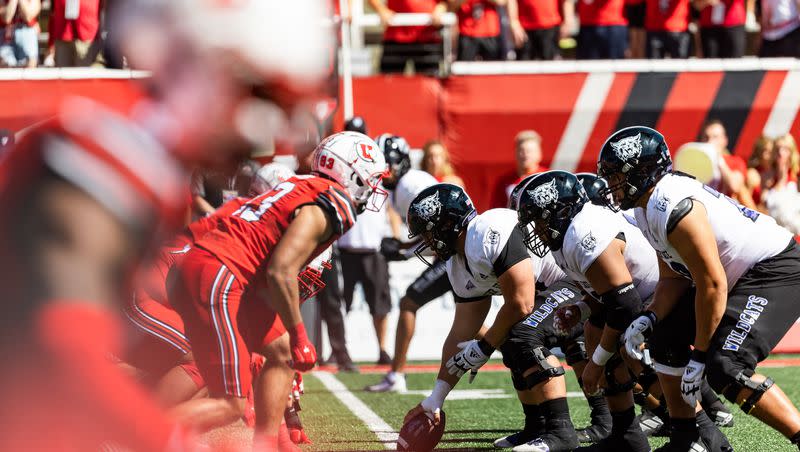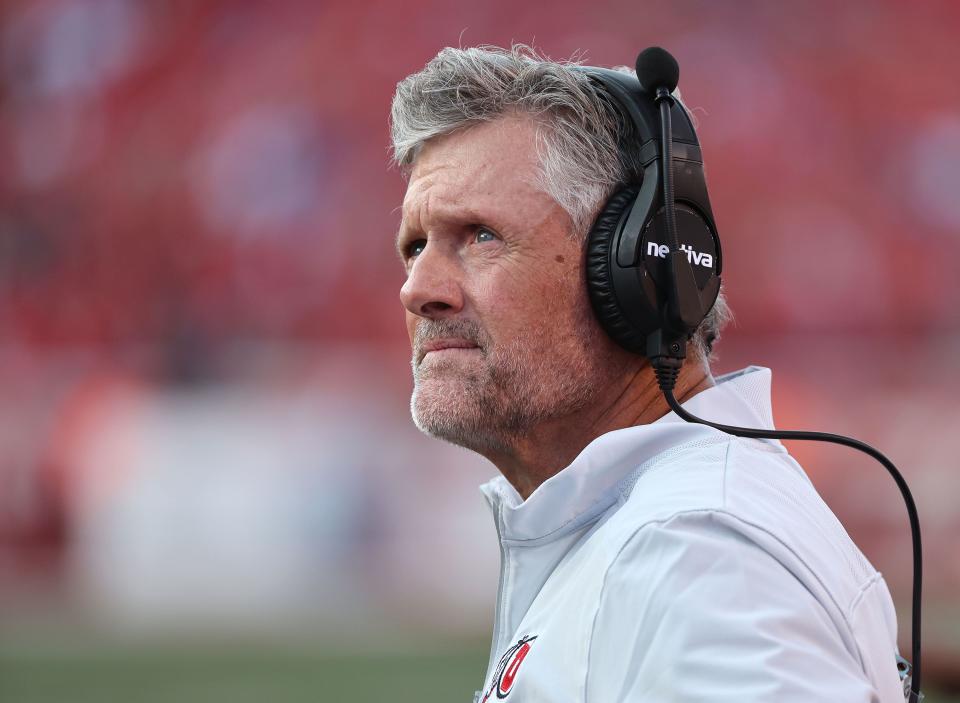NIL has a side benefit — players are staying in school longer — but rule still needs restraints

- Oops!Something went wrong.Please try again later.
College football had no idea what it was unleashing when it allowed athletes to participate in the free enterprise system, like the rest of America. Suddenly, athletes who previously couldn’t accept a pizza from their coach could market their name, image and likeness — under the NIL rule — and it has rocked the game.
“With rare exceptions, you get one shot, and that’s it. They don’t draft a player thinking ‘we can make him a player.’ There are too many good players out there. If you’re not ready, they’ll move on.” — Utah coach Kyle Whittingham on the NFL
It has completely changed recruiting. It has enabled boosters to openly lure athletes from other schools. It has created even more advantages for the traditional powers in a system that already favors them and suffers from a dearth of parity. College football is in such disarray that Congress, in the midst of wars, social unrest and border issues, is taking time to hold hearings this month about issues related to NIL.
NIL is a boon for the athletes, but a headache for the overseers of the game, if anyone can figure out who that is anymore. No one can argue that athletes deserve to own their own image and profit from it — the draconian NCAA, you might remember, brazenly claimed the right to both in perpetuity. And, despite being a disruptive force, NIL also seems to be producing an unintended side effect: Athletes are staying in school longer because of it.
“It’s becoming more prevalent,” says Utah coach Kyle Whittingham, who has been a voice of reason on NIL issues. “There’s a definite increase in the number of guys staying for that extra year or two because they can earn money through NIL and, in some cases, do better than they would in the NFL.”
Related
Senator comments on impact of NIL using Utah truck deal as an example
The looming threat of NIL and the changing face of college sports
Players who are uncertain about where they would fall in the draft, or who are pegged as middle- to late-round picks, can afford to stay in school and improve their skills along with the bonus of earning a degree (remember that part — school?). According to Sportskeeda, the NFL wage for players chosen in the fifth round ranges from $670,000 to almost $700,000; for sixth-rounders, it’s $640,000 to $663,000; for seventh-rounders it’s $630,000 to $640,000. And then there’s this caveat: Only players chosen in the first four rounds are given guaranteed contracts. According to On3.com, which updates the list of NIL deals weekly, 100 players have NIL deals worth more than $481,000, and 62 of those players top $600,000 in earnings.
“We’ve already had a few instances where guys have opted to stay because of the NIL deals here,” says Whittingham. “The NFL is not a developmental league. Make sure when you come out that you’re ready. It’s ultra-competitive. With rare exceptions, you get one shot, and that’s it. They don’t draft a player thinking ‘we can make him a player.’ There are too many good players out there. If you’re not ready, they’ll move on.”
College football is to the NFL what the minor leagues are to Major League Baseball.
Like every top-25 school, Utah has a number of players — all of them serious NFL prospects — who are supposedly earning six-figure incomes from NIL, according to the On3.com website (who knows how accurate these valuations are, though). That’s enough to put gas in the car, pay for a date and then some. That certainly has made it easier for the players to remain in school rather than declare for the draft.
Related
The decision to return is not without risk; both quarterback Cam Rising and tight end Brant Kuithe have been unable to play this year because of injury. If neither can return this season, they face the dilemma again of whether to declare for the draft or return for another season via a medical redshirt.
All this notwithstanding, for the general health of college football many, if not most coaches think there needs to be some restrictions placed on NIL, and that is what has brought the issue to Congress. A year ago Whittingham expressed the sentiment of many when he told reporters that the day was coming “in the very, very near future where the top 25 NIL pots of money are going to mirror exactly the top 25 teams in the country.”
Asked to comment this week on the current state of NIL, Whittingham said, “It’s a positive thing. It’s been long overdue that the (players) be compensated. But it sure would be nice to have some guardrails on it.” When asked how this can be achieved, Whittingham says, “I don’t know if you can do it unless you make them employees. It’s capitalism. How can you tell a guy how much he can earn unless they’re employees? … Ultimately, it’s going to get to that or a form of that.”
He’s right. To put restraints on NIL hinges on redefining the student-athletes’ relationship to their university — are they employees? The NCAA has vehemently resisted such a definition for years in order to maintain its silly, hypocritical notions of amateurism and avoid the liabilities and responsibilities that come with being an employer. This is what is being debated in Congress. Regardless of what happens, the floodgates have been opened in college football and for the good of the game it needs some limitations.


